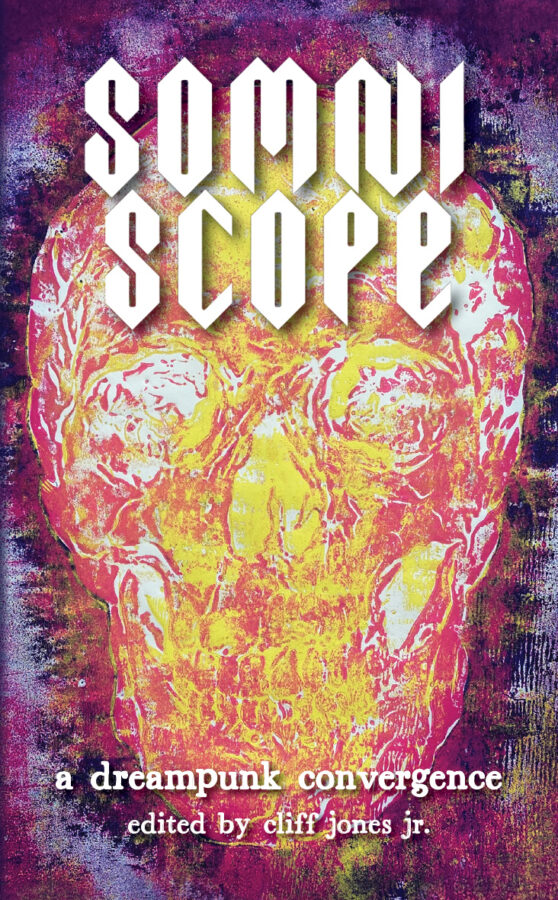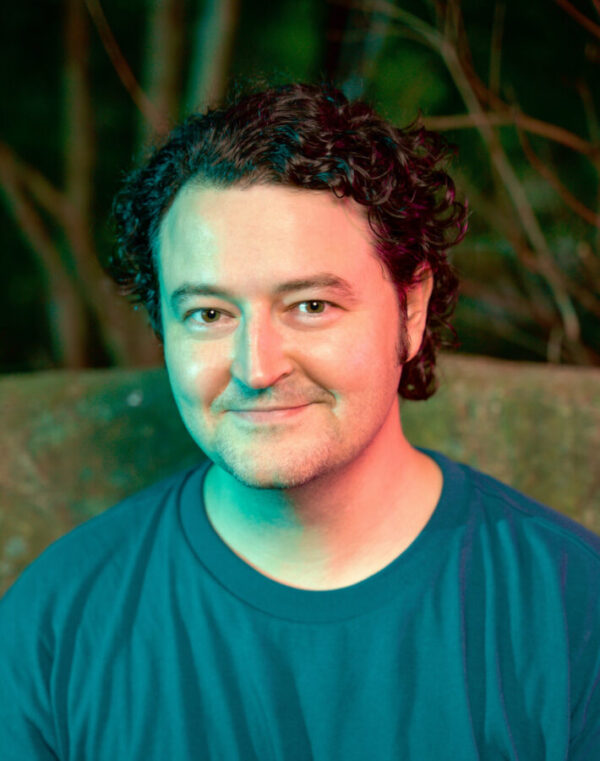Welcome to my weekly Author Spotlight. I’ve asked a bunch of my author friends to answer a set of interview questions, and to share their latest work.
Today: Cliff is a software developer by day, but he likes to spend his evenings on long walks writing strange, often psychedelic fiction. His specialty is dreampunk, the weird hippie cousin of cyberpunk. Visit CliffJonesJr.com when you’re ready to go down that rabbit hole.
Thanks so much, Cliff, for joining me!
J. Scott Coatsworth: How would you describe your writing style/genre?
Cliff Jones Jr.: The niche genre that I’ve settled into is dreampunk. It sounds like steampunk, I know, but it tends to have more in common with cyberpunk. That said, dreampunk stories aren’t necessarily about technology at all. They could involve high-tech gadgetry, sure, but all they really need is some kind of dreamlike experience (an actual dream, a drug trip, a mystic vision, a near-death experience, etc.) and a progressive punk attitude. The genre is distrustful of powerful organizations like corporations, religions, and governments—much more sympathetic to misfit outsiders struggling to get by in a deeply flawed world.
JSC: What was your first published work? Tell me a little about it.
CJ2: My first published fiction was actually a multi-author short story collection. I feel like that’s got to be pretty unusual because 1) books like that are a hard sell, and 2) how do you as a newcomer convince a bunch of established authors to write new stories for you? It was the “dreampunk” label that pulled us all together (mostly through Wattpad and Facebook). The result was Mirrormaze: A Dreampunk Anthology (2020). I mostly just wanted to get the genre established in print, but it was so much fun that I had to follow up with Somniscope: A Dreampunk Convergence, released earlier this year.
JSC: If you could tell your younger writing self anything, what would it be?
CJ2: Start with short stories. They’re so much easier to finish before losing steam or getting distracted by another project. Don’t worry about getting them published until after you’ve written a bunch. Of course, this is much easier said than done because it’s hard to stay motivated without readers cheering you on. I’m still working on that part. Anyway, if you can write around twenty short stories and have them all connect in a sequence, then you’ve got yourself a novel! And let’s face it, novels are the only thing most readers pay attention to. Maybe that’s changing, but these things take time.
JSC: What is the most heartfelt thing a reader has said to you?
CJ2: About a particular passage in The Lasting Lands, an early reader left a comment saying that maybe it was because she was lying in bed next to her sleeping daughter while she was reading it, but I had her sobbing. That felt good because I also have a daughter (two now), and when I wrote that part, I was crying too. Connecting with readers like that is what it’s all about for me.
JSC: Where do you like to write?
CJ2: This may be a little hard to believe, but I often write in the woods at night. I’ll take a walk with my phone and just thumb-type away. I liked it even better when I lived in El Paso and I could walk around in the foothills of the Franklin Mountains. I might also take my laptop somewhere (a coffee shop, a bar, a college campus, etc.), but the phone is great because I don’t have to plan things out ahead of time quite so much. The mood strikes me, and I just write. Many thanks to my wife for looking after the kids when I’ve gone on these night walks.
JSC: What are your least favorite parts of publishing?
CJ2: Oof, where to begin? The good part is when people read my writing and enjoy it. The rest is work, which is why people get paid for it. I guess the worst part for me is writing those query letters trying to find an agent (which I still don’t have) or sell my book to a publisher directly. Writing fiction is my calling, as in calling me away from my day job into a fantasy world where I just daydream and compose and maybe create some artwork to go along with the story. But then I have to pivot to writing formal emails and reducing my beautiful babies to 500-to-800-word synopses. It’s painful.
JSC: If you had a grant to write any book you wanted as a freebie without worrying about sales, what kind of story would you like to tell?
CJ2: Honestly, I’d be writing the exact same books. I have a totally separate career as a software developer that pays the bills, so I’ve never been too stressed about the books making money. If I had enough funding to focus only on writing though, that would be a game changer. With the ability to focus my attention like that, I’d be able to write a whole novel in a month or two, so I’m sure I’d get more experimental pretty quickly. Actually, I’d love to write more novellas like Dreck, or even novelettes. I feel like that length is generally enough to do whatever you need that story to do—except of course when full immersion is the goal, essential to the reader’s experience. That’s great sometimes; I just don’t think it’s needed for every story.
JSC: What are some day jobs that you have held? If any of them impacted your writing, share an example.
CJ2: I feel like all the jobs I’ve held have impacted my writing because they’ve impacted me as a person. Experience of any kind changes you, so there’s always that. As a teenager, I mowed lawns and worked construction for a bit. I also did a couple of stints as a pizza delivery driver, but mostly I’ve been either in academia or software development. My wife and I moved to Japan to teach English when our first daughter was a toddler. Then when we moved back to Texas (when the student loans came due), I went to grad school for linguistics while doing some teaching and lab management on the side. After that, I managed a college writing center for a couple of years. I finally gave up on making enough in my chosen profession to pay the bills and moved to software development, which tends to pay muchbetter than teaching, sadly. I’ve actually been coding since I was 13 or so, and I’m pretty good at it, so that’s the day job. I’ve included a few developer characters in my stories so far, and I may get into that more in the future, but it’s not really my passion, so I tend to use programming more as a symbol of drudgery, like something tedious you have to do to get by.
JSC: What’s your drink of choice?
CJ2: At the moment, I’m really into a whiskey cocktail I made up that’s a spin on the boulevardier. You basically just use Pathfinder non-alcoholic spirit in place of Campari. So that’s two parts whiskey, one part Pathfinder, and one part ruby port or sweet vermouth. Garnish with a twist of lemon. Let’s call this the “cheminier.” Try it and let me know what you think!
JSC: What are you working on now, and what’s coming out next? Tell us about it!
CJ2: I’m just now wrapping up a dreampunk fantasy novel I’ve had brewing for about a decade: The Lasting Lands. The story is fully complete; I just have a few things to tie up with chapter headings and secondary text like that. It started off as sort of a Wizard of Oz / Alice in Wonderland mashup, but there’s much more to it than that. All kinds of mythology and folklore get pulled in. It’s definitely a fusion of fantasy and science fiction, with a bit of cosmic horror as well, but at its core that’s all psychological, so it’s hard to categorize. Hence “dreampunk.” I think this one may be my magnum opus. Be patient. It’s coming.

And now for Cliff’s latest title: Somniscope Anthology:
The visionary minds behind Mirrormaze: A Dreampunk Anthology are back in force with a book that defies categorization. Is it a collection of short fiction? Sure. A multi-author novel? That too. Turn on, tune in, and blast off into a dream like no other! But fair warning: Once you enter the world of Somniscope, you may never again feel at home in your waking life.
Publisher | Amazon | Barnes & Noble
Excerpt
Another lonely night, another borrowed dream. I know I’ll never get to sleep on my own, so why bother trying? It’ll only waste time, and I’ve got to be up in six hours. Five and a half now.
What is it about other people’s lives that satisfies that gnawing hunger in my chest, if only for a moment? Living in someone else’s skin scratches an itch that can’t be reached any other way. All the little parts of myself that aggravate like a pebble in my shoe . . . they’re just gone. Sure, everybody’s got problems, but they don’t have my problems, not exactly. It’s this momentary relief that keeps me coming back night after night.
So I pull out the device, plug it into the wall beside my futon, slip on the headset, and lie back onto my pillow. I close my eyes and listen to those ten hypnotic clicks, my countdown to dreamland. Precisely one second after the tenth click, I lose consciousness. There in front of my eyes is the loading screen: “Somniscope.”

